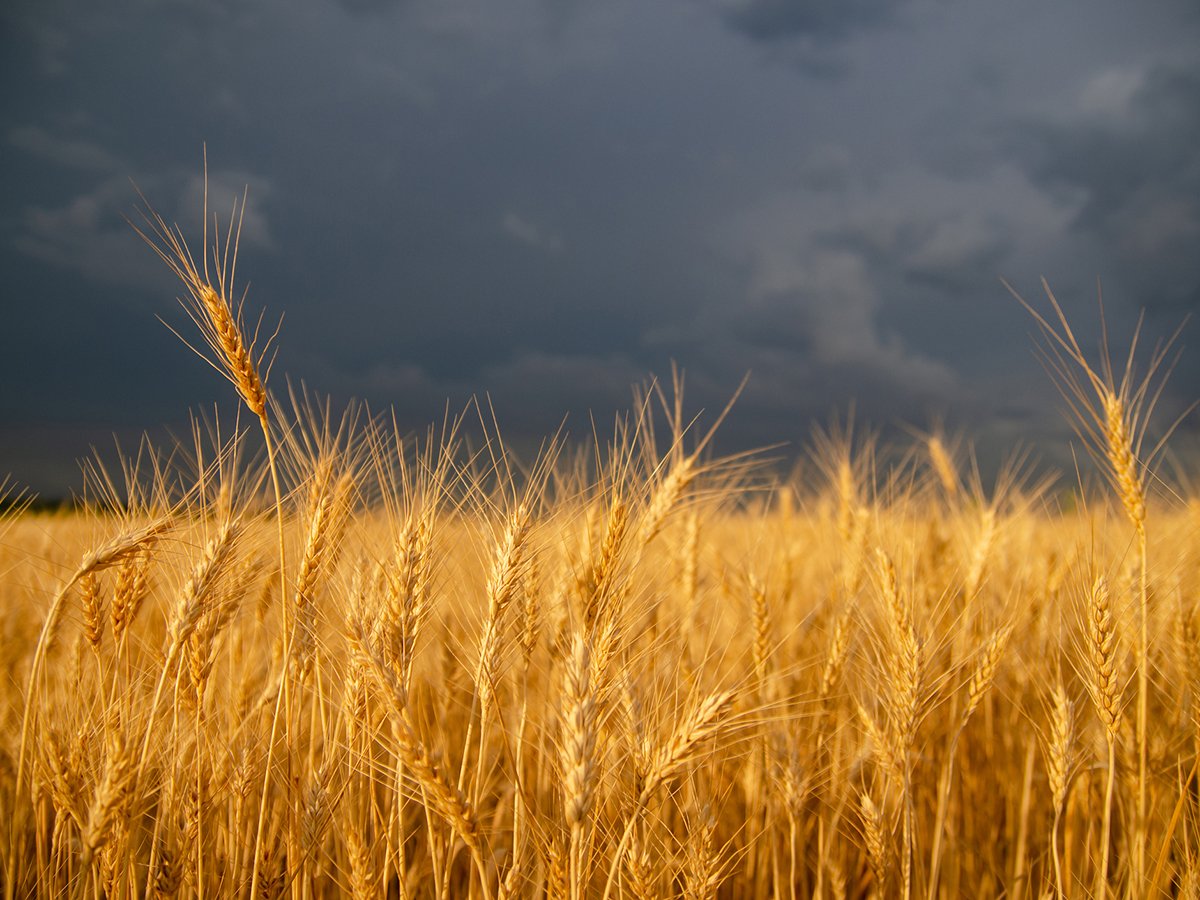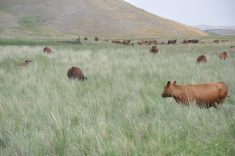Marketing choice; Cat advice; Stop rhetoric; Ignatieff chance; MPs’ judgment; Where’s whetstone; Railcar loss; No more corners; Pay it back; Farmer’s money; Freight overcharges
Marketing choice
I have read, heard first-hand from my father and our neighbours and lived a lot of it myself how people who settled in Western Canada had to work together to do things they could not do by themselves.
To have fresh meat, they would take turns butchering and share the meat with others in the area. They called it a meat ring.
Read Also

Late season rainfall creates concern about Prairie crop quality
Praying for rain is being replaced with the hope that rain can stop for harvest. Rainfall in July and early August has been much greater than normal.
If there was no coal dealer in town, they would jointly order a car of coal and each take a part. Many towns did not have a dealer where they could buy a barrel of coal oil to heat their house or gas for the car….
It’s been well documented what was going on in the grain trade. They had marketing choice. I heard my father and some neighbours talk about hauling grain by horse and sleigh over 20 miles to town at the end of the rail…. After approaching all of them, it was, “we will give you No. 3, take it or take it home.”…
Was it any wonder farmers started their own elevator in the three provinces: United Grain Growers, Alberta Pool, Saskatchewan Wheat Pool, Manitoba Pool Elevators? If our forefathers who spent so much time and effort in establishing these farmer organizations would see the end results of their efforts, they would turn in their graves….
If you want to know where this freedom marketing choice, everyone for themselves originated, the genesis goes right back to an organization I had never heard of in Calgary, the National Citizens Coalition. Its (former) president is Stephen Harper, the prime minister of Canada….
It’s hard to comprehend organizations and parties trying to impose an ideology of everyone-for-himself on a region of Canada that has co-operated and worked together in areas they couldn’t do themselves for many years.
The recent Canadian Wheat Board election is proof that the concept of people jointly can do a better job than in competition with each other. It is also proof that concept is still well today and has been passed down from our forefathers….
(Federal agriculture minister Gerry) Ritz has said farmers have spoken, the CWB issue is off the table. With their record of changing positions and all of the heavy-handed dishonesty used during the elections, I’m not convinced.
A better and surer way would be to take this government off the table.
– Avery Sahl,
Mossbank, Sask.
Cat advice
We would like to say thank you for the article on farm cats (Protect farm cats to help protect the farm, WP, Jan. 8.) by Dr. Roy Lewis.
We found it very informative and interesting. We always wondered why our cats were sniffling and sneezing. We enjoy The Western Producer. Thank you.
– Joy and Anna Beam,
Shellbrook, Sask.
Stop rhetoric
An article in the Jan. 15 edition of the WP (WCWGA disappointed with past year) contains a quote by Mr. Neil Wandel of the Australian CBH Group that is very interesting. Mr. Wandel is quoted as saying, “monopolies also can harbour inefficiencies, laziness and arrogance.”
I would suggest that not only monopolies have a monopoly on this type of behaviour. If Mr. Wandel remembers the actions of the big three, the AIG Insurance Group and several other private, and non-monopolistic recently bailed out companies, he might expand his statement to include them as well.
It is easy to make blanket statements but sometimes the blanket includes unwanted or unanticipated results. Surely the past year has shown that the qualities mentioned by Mr. Wandel are not restricted to any one sector of business or society.
It would be simple but also simplistic to paint certain organizations with the same brush, but humanity is a complex organism and is not easily stereotyped. This would indicate that any organization has the capability for ineptitude regardless of its label.
The Western Canadian Wheat Growers Association, of course, prefers to keep things simple in line with Mr. Wandel’s remarks, but those are not the facts nor reality. It is too bad that the WCWGA does not seem to tire of bashing the Canadian Wheat Board and can always find speakers or writers to support their allegations.
The world is no longer a simple place to do business, if it ever was, and the CWB seems to have recognized that fact and is changing its processes to adapt to changing conditions.
Perhaps in the future the WCWGA will also recognize that policies that made perfect sense years ago are no longer valid and it may be time to put some hobby horses out to pasture and get to work with new implements….
I suspect that what I am trying to say in my clumsy way is that it is time to work for real solutions to real problems which affect all farmers. Let’s leave the rhetoric to people with too much money.
– Horst Schreiber,
Ohaton, Alta.
Ignatieff chance
Re: “New Liberal leader woos West” (WP, Dec. 18.)
Michael Ignatieff, the newly minted Liberal leader, vowed to work hard to reconnect his party with rural and agriculture communities across Canada.
He further stated (that he wants) to reach out and hope that western Canadians forgive (the Liberals) and forget the errors the party has made in the past.
For western grain producers, the two most destructive policies forged by past Liberal governments (were removal of) the Crow Rate and the privatization of the Canadian National Railway.
Since then it has become almost impossible to survive financially as a grain producer. This is due to a massive power shift that greatly favoured the railroads and the transnational grain corporations at the expense of grain producers.
Farm debt has nearly doubled in recent years. Every year thousands of farmers face bankruptcy or choose to leave the land. Can we, the grain producers of Western Canada, forgive and forget?
Myself personally, I can forgive but it would not be wise to forget. However, past action and performance by the Harper government has clearly indicated that there is no salvation to be had in that direction. Western Canadian farmers must look elsewhere.
Perhaps Michael Ignatieff is sincere about reaching out to western Canadian farmers.
I am in favour of giving him that chance. Do we have much choice?
– George E. Hickie,
Waldron, Sask.
MPs’ judgment
It was (recently) revealed that the RCMP is going to investigate five Conservative MPs who have unfairly and perhaps illegally interfered in the recent election of directors for the Canadian Wheat Board.
Veteran MPs David Anderson, Andrew Scheer, Ed Komarnicki from Saskatchewan and Kevin Sorenson from Alberta joined neophyte Saskatchewan MP Randy Hoback in sending letters to voters encouraging them to vote for candidates who want to shut down the CWB.
The MP letters raise questions of proper conduct on several levels. How did the MPs get access to a voters’ list that is protected for the use of candidates only? Why did the MPs use taxpayers’ money to execute their plan?
Since when did Conservative MPs get the authority or privilege to use taxpayer resources to direct voters how to vote? Are we to expect Conservative MPs to send rural voters letters as how to vote in the next rural municipality or school board elections?
Apart from the investigation that the RCMP is now leading, there are also questions about a parliamentary code, which also appears to have been breached.
According to the code, MPs are not supposed to help their friends become “… a director or officer in a corporation, association or trade union …”.
In one of the letters sent, MP David Anderson urges voters to cast their ballots for Sam Magnus, a long-time Conservative organizer and friend of Anderson’s. Magnus also campaigned on eliminating farmers’ marketing power by dismantling the CWB, a policy position shared by the federal Conservative party.
The MPs’ lack of judgment in sending the letters in the first place is compounded by the reaction of voters who received them. Many farmers found the letters to be intrusive….
In the end, the letters misfired. Voters in the four districts who received letters endorsed candidates who support a strong CWB.
Now it’s up to the RCMP to see if the MPs deserve to get their knuckles rapped. Whatever the outcome, it shows the despicable lengths this government is prepared to go to get what it wants, regardless of what the true stakeholders want!
– Wilfred “Butch” Harder,
Lowe Farm, Man.
Where’s whetstone
Who can steal the most wheat, our bureaucrats or our capitalists? Other games are afoot that should be of concern to the nation’s food producers and consumers.
There has been a run on whetstones in the backstreets of Bytown by a conclave of demagogue wannabes who do not appear to be willing to wait until March for the stabbing party.
Apparently these ideologically addled and anointed individuals expect us to believe this action can fall under the aegis of fiscal and constitutional responsibility.
Our exchequer has been beggared by dogmatic intrigues and decades of useless exercises in social engineering. Is there someone out there with the courage, the conviction, and the vision of a Roderigo Diaz de Bivar?
– Tom Lamont,
Maidstone, Sask.
Railcar loss
I just finished reading the article in your Jan. 22 issue regarding the safety record of CN Rail (CN defends safety record despite woes).
The article states that during the last four years the railroads destroyed 74 hopper cars, CN 65 and CP nine, with a loss of 7,600 tonnes of grain.
This resulted in a combined loss to farmers of just over $3 million. A loss to farmers?
If I were to rent a piece of equipment and destroyed it, I would be responsible for the cost of that equipment. If I was moving someone’s product and a loss occurred, I would be responsible for the cost of that product.
The Canadian Wheat Board is constantly telling anyone who will listen how well they are protecting the interests of farmers. If the information in the article is accurate, and if the CWB was properly taking care of farmers’ interests, why are the railroads’ accidents costing the farmers anything?
– Roger Brandl,
Fort St. John, B.C.
No more corners
The cattlemen have run out of corners to pull money out of. The high cost of feed has taken a lot of them right out of business.
Last year fuel prices have almost doubled. Cattle prices have not gone up. The family stress is beyond its peak and worst of all, our federal agriculture minister (Gerry Ritz) missed the boat.
He has repeatedly said that AgriStability is in place to help out. Prime minister Stephen Harper has probably contemplated giving him a raise because of the money he has saved the government.
Just to compare. AgriStability would take about the third year to give any money if it would. I guess they should say thank you instead of the word that comes to mind.
Ritz’s true colours came out when he gave the remarks concerning the listeria outbreak.
The other side is (that) farm credit is the worst of the creditors. Their collateral is protected three times over. They have even demanded loans that were not even in arrears. They are ready for repossession on exactly the day the law permits.
Credit unions have cancelled lines of credit, forcing the cattlemen to burn the candle from both ends. Banks probably the same. They say, “phone and talk to us.”
If the farmer does phone, they say cattle have become a liability, (and they) want money.
The government gave some people advances. First they took their arrears. By the time the producers got the money, their bills had accumulated 24 percent interest so they actually received 55 percent of the money and have to give 110 percent of it back.
If you mention AgriStability to the banker, he laughs and says “not in our lifetime.”
– Murray Andres,
MacNutt, Sask.
Pay it back
As farmers sell their products on the world market, it seems so easy to have all the companies that handle or administer the sale to charge a healthy fee for handling, transportation, marketing and research, all deducted before the final cheque is cut, without the cost of producing the product figured in as another fixed cost to the farmer.
When the railways overcharge for their slice of the take, it seems to automatically develop a whole bunch of problems. How they can pay the outstanding sum of some $60 million back to the farmer without sharing a whole bunch of administration?
The Canadian Wheat Board has records of all grains sold through the board. The specialty crop handling facilities have records of all handlings. Each farmer has a sales slip for all grains sold in each crop year, which could be filled out on a simple form.
We are living in a computerized world where all the information is at our finger tips. What is the problem?
I am sure that if the farmer had been overpaid, he would have orders to repay immediately and to where it should go.
I congratulate Gordon Wallace for having the guts to take railroads to task on this issue. This is a very important move and every farmer should support him fully on this case.
It seems our federal government is sleeping at the switch or are too busy trying to get rid of the CWB to notice a $60 million extra charge to the farmers by the railroads’ maintenance sector.
We already pay a check-off fee for research. How much is needed for this program? This railroad money should not be locked up in some account drawing interest for the same program that is already funded.
This account should be paid back to the grain producers as simple as possible. End of story.
– Verne Robbie,
Herschel, Sask.
Farmer’s money
Re: your Jan. 8 article, “Railways to repay millions.”
Who are the railways supposed to repay this surcharge to? How is it that in the same article, it is mentioned that “much of the money will be invested with interest earnings going to research projects.” Who decided this?
The way I see it, this money belongs to the farmers.
– O. Yanishewski,
Spirit River, Alta.
Freight overcharges
Some $68.7 million was overcharged and paid to the railroad companies and must be refunded to the farmers as soon as possible.
The Canadian Wheat Board has agreed to the passing of these illegally collected monies to the Western Grains Research Foundation. This too is unlawful as the WGRF already gets a checkoff from every tonne of grain sold.
Naturally, this would be a marvelous windfall for them. This money belongs to the farmers.
They were overcharged $2.23 per tonne of grain shipped in 2007 and 2008. Therefore the overcharge belongs to the farmers.
At one time the freight rate was fixed by the Crow Rate program for landlocked grain producers to assist them in overseas marketing.
However, the Crow was discontinued. Today the railways are controlled by a freight cap that regulates what they can charge.
How come this overcharging has gone on undetected for so long? It’s been apparent to grain farmers that the railroad sees this cap as unfair as the quality of their services have greatly deteriorated.
The CWB thinks they have the right to determine the direction of where this unlawfully charged money should go and have stated that it would cost too much to return it to the rightful owners.
What has it cost farmers? The mailing of this money back to the rightful owners could be easily included in the interim or final payments. Since when did the offenders think this gross mistake shouldn’t cost them anything? …
I encourage other grain farmers to write or e-mail or contact your local MP’s office and register your complaints. The more of us who will do this, the stronger our united voice will be against this injustice.
– C. L. Edwards,
Ponoka, Alta.
















